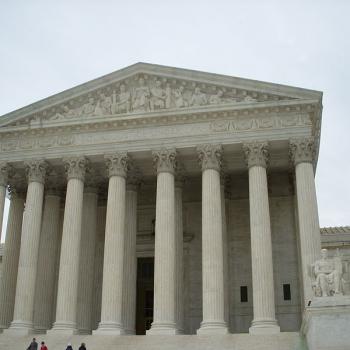
Yesterday, the Supreme Court upheld a Colorado baker’s decision to refuse to bake a wedding cake for a gay couple. It was an oddly narrow decision that reaffirmed protections for gay rights while simultaneously allowing the baker to violate them.
The case was argued on two grounds – free speech and free exercise of religion. Regarding free speech, the argument that baking a cake is a speech act did not seem to hold much traction. Neither did the majority opinion hold that a businessperson has a right to discriminate based on their religious beliefs.
The Supreme Court’s Decision
Surprisingly, perhaps, the decision was ultimately decided on very narrow grounds. The majority ruled in favor of the baker based on the judgment that the Colorado Civil Rights Commission demonstrated “hostility” to religion. The Civil Rights Commission had made the original ruling against the baker.
What Justice Kennedy is referring to here are remarks that were made by one member of the Commission who said:
Freedom of religion and religion has been used to justify all kinds of discrimination throughout history, whether it be slavery, whether it be the holocaust, whether it be – I mean, we – we can list hundreds of situations where freedom of religion has been used to justify discrimination.
So far, what this Commissioner said is simply fact. Religion has been used in exactly this way throughout history. Furthermore, religious people continue to claim “freedom of religion” to justify misogyny, violence, homophobia, and other egregious and uncivil behaviors.
Here’s where it gets tricky
However, the Commissioner went on to say:
And to me it is one of the most despicable pieces of rhetoric that people can use to – to use their religion to hurt others.
This is what really seemed to set Justice Kennedy off. He argued in response:
To describe a man’s faith as “one of the most despicable pieces of rhetoric that people can use” is to disparage his religion in at least two distinct ways: by describing it as despicable, and also by characterizing it as merely rhetorical – something insubstantial and even insincere.
Based on this statement of one Commissioner, Kennedy held that the whole Colorado Civil Rights Commission failed to uphold their responsibility of “fair and neutral enforcement of Colorado’s anti-discrimination law – a law that protects discrimination on the basis of religion as well as sexual orientation.”
The opinion equivocated on a number of points and fairly invited further cases by stating:
The outcome of cases like this in other circumstances must await further elaboration in the courts, all in the context of recognizing that these disputes must be resolved with tolerance, without undue disrespect to sincere religious beliefs, and without subjecting gay persons to indignities when they seek goods and services in an open market.
Just what is “undue disrespect”?
It is the phrase “without undue disrespect to sincere religious beliefs” that gives me pause.
How are we to determine what constitutes “undue disrespect”? Is that another way of saying we need to respect these “sincere religious beliefs”? Who decides what is “undue”?
After all, we live in a country where Christians hold some horribly disrespectful beliefs.
Some of these beliefs are against the law. As in, some Christians sincerely believe that they have the right to beat their wives and some of their wives have been taught to believe they deserve it.
Some of these beliefs are used to harm women. As in, some Christians who sincerely believe that fertilized eggs are human beings are interfering with women’s access to birth control and abortion.
Some of these beliefs are simply morally abhorrent. As in, some Christians sincerely believe that the white race is morally, physically, and intellectually superior to all other races.
Freedom of speech means that we must allow people to express their beliefs, however abhorrent. It doesn’t mean we must respect those beliefs.
The same must be said for freedom of religion. While people have a right to believe whatever they wish, they do not have a right to act on those beliefs when they harm other people.
My faith calls me to challenge hatred
My faith calls me to respect other people and to seek the good in them. I do not, however, believe that I am called to respect their “sincere religious beliefs.” In fact, I believe that my faith calls me to challenge beliefs that are hateful, hurtful, and harmful to other human beings.
What exactly does it mean to “respect” beliefs that violate the humanity of others?
I think the opinion would have been better served to have asked that these disputes be resolved without undue disrespect to people who hold sincerely held-religious beliefs.
Some beliefs do not warrant my respect, no matter how sincerely held.












